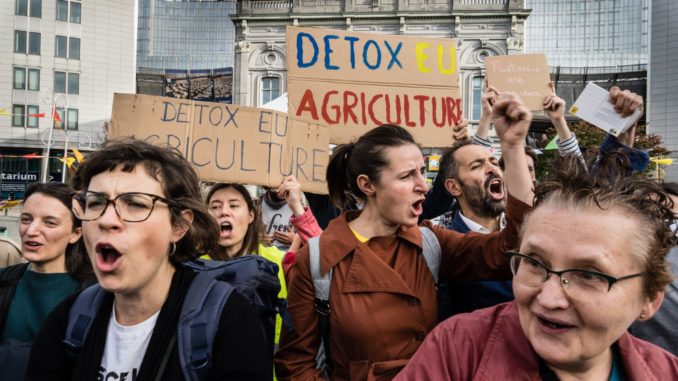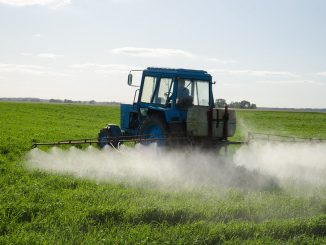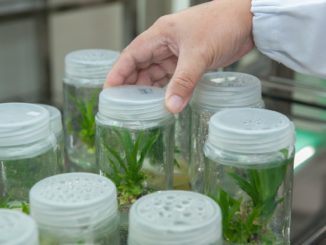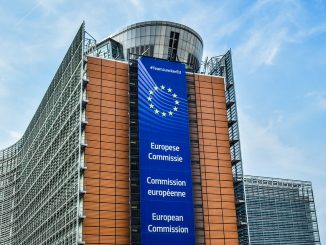
As Ministers at COP 15 meet in Montreal to pontificate about biodiversity, back home in Europe they are working hard to keep nature-destroying pesticides flowing. The EU’s attempt at updating the pesticide regulation – the SUR – may now be delayed by 6 months if Ministers get their way. This is because of a spurious call for another impact assessment, a call which has already passed the Permanent Representatives Committee. Scientists and civil society are now focused on the Council Meeting on Transport and Energy, to be held on 19th of December, when the next delay of SUR, may be copper-fastened. Ashley Parsons and Oliver Moore report. (Updated 13.48 to add link to scientists SUR letter)
—
As European Ministers talk the talk about protecting biodiversity at COP15 in Montreal, here in Europe, these same politicians are doing all they can to avoid walking the walk.
On Saturday December 10, at the Permanent Representatives Committee, a proposal by the Czech Presidency progressed. This was to submit a formal request for an additional impact assessment on the SUR – the Sustainable Use of Pesticides Regulation.
The SUR is the EU’s attempt to update current pesticide legislation, to make IPM (Integrated Pest Management) – which is already supposed to be mainstreaming – more routinised, and to start the process of reaching the EU Green Deal pesticide reduction targets.
The request for another impact assessment will become an A-point on the Agenda the 19th of December at the Council Meeting on Transport and Energy.
This is a step further by politicians to derail the Green Deal, a process that has been ongoing directly for months since the European Commission proposed updating the pesticide regulation back in June. (see links below for a comprehensive chronicling of this process)
Crisis? Opportunity!
This appears for now to be a win for the pesticide lobby and big ag more generally. In a document recounting the minutes of a closed meeting, as requested via FOI and first revealed by Desmog, Copa-Cogeca insisted on significant changes to the EU sustainable farming plans, and specifically that national plans of Member States for pesticide reductions need to be adjusted.
Minutes of April 28th Meeting COPA COGECA
Using the context of war in Ukraine, certain long-standing policy asks, which could potentially endanger environmental safeguards, have been re-appropriated to promote a particular iteration of food security.
This is starkly clear in the updated Industry Influence on Biodiversity Policy report by InfluenceMap.
Influence Maps research points out that “industry associations representing key sectors and some of the largest companies in the world are lobbying to delay, dilute and rollback critically needed policy aimed at preventing and reversing biodiversity loss in the EU and US.”
Moreover “industry associations are opposed to almost all major biodiversity-relevant policies and regulations, with 89% of the policy engagement analyzed found to be aimed at blocking progress on addressing biodiversity loss”.
Corporate Europe Observatory has also revealed, with documented evidence, how “a coordinated attack by industrial agri-food lobbies on the EU’s sustainable food (Farm to Fork) strategy. The lobby strategy aims to create an echo chamber of anti-Farm to Fork messages using partial findings from a series of ‘impact studies’, many of which funded by the industry itself”.
What will be in the Additional Impact Assessment?
According to a leaked document seen by ARC, the additional impact assessment will assess the following points:
- a) quantitative impacts on agricultural yields with regards to the specific conditions of Member States and different climate regions.
- b) analysis of consequences on the availability of food and feed in the Union and if this will increase dependence on import of food and feed as well as the impact on exports.
- c) potential impact on food and feed prices in general
- d) quantified impacts of additional administrative burden for small and medium-sized farms;
- e) the availability of alternatives to plant protection products
An additional impact assessment could delay the SUR by at least 6-months, likely more. The document also states that member states are “wishing to continue with the examination of various technical aspects of the proposal without undue delays” .
This means in effect that no major progress on pesticide reduction legislation will happen while the assessment is ongoing. Limiting negotiations to technical aspects is placation – negotiations could otherwise continue on concrete aspects of the legislation: determining how it will be applied to sensitive areas, forests, and how legally binding targets will be applied.
That said, this is still contested. A confirmed source inside the Parliament revealed that negotiations will nevertheless continue during the additional impact assessment. This source also points out that the Commission should finish collecting the extra data before the 6 month limit.
So there is still much to play for in the coming months.
Refuting the case for Additional Impact Assessment
The official reason for an additional impact assessment is that the SUR proposal in its current form “does not take into account the possible long-term impacts of the proposed Regulation on food security in the Union. The fact that the impact assessment was concluded before the war in Ukraine and the energy, fertilisers and food price crises, further validates these concerns.”
This argument is ever more flimsy, as NGOs and Scientists show.
A collection of concerned NGOs have made one final push to salvage the SUR in the here and now.
The Save Bees and Farmers’ Citizens Committee – representing 1.1 million EU citizens who signed the Save the Bees and Farmers Initiative – has released a last push open letter before the upcoming Monday Dec 19 meeting:
“We are deeply concerned that delays caused by this additional assessment could thwart a decision in this legislative period on urgent pesticide reduction and biodiversity restoration.
And further, commenting on the continued technical negotiations meant to pass during the additional impact assessment period, the letter states that “this clause will open up almost unlimited possibilities for those aiming to derail the legislative process and prevent its conclusion before the upcoming European elections, with far-reaching consequences for the biodiversity strategy, the Farm to Fork Strategy, and thus for the European Green Deal.”
Read/Download Open Letter ECI to Council
Meanwhile, a group of scientists – over 300 so far, and growing – have signed a letter expressing “deep concern” at efforts “to delay and or water down the new pesticides regulation”, using “questionable ‘food security’ and ‘resilience’ concerns.”
The letter points out that “the long-term challenges facing the EU food system and state of biodiversity have not changed since the outbreak of the war in Ukraine” and calls out failure in policies already supposedly in place: “Lack of binding targets is exactly the reason why investments in Integrated Pest Management have lagged behind since the adoption of the 2009 Pesticides Directive. The adoption of binding targets and a reallocation of public resources is expected to accelerate innovation of non-hazardous pesticide alternatives”
This group of scientists reiterates that the “Potsdam Statement remains unreservedly valid”. This April 4th letter then signed by 600+ scientists, emphasises “demand side action” – focused on less animal products in high income countries, more legumes, a strengthened farm to fork strategy and less food waste.
As that letter stated: “Today’s global food production is more than sufficient to feed an even higher world population. However, grains are fed to animals, used as biofuels, or wasted rather than supplied to those with limited financial means…
Contrary to what ongoing discussions might imply, European food security is not under threat from the Ukraine crisis. Rather, Europe is threatened by a long-standing crisis of unhealthy diets with consumption of refined grains and animal products markedly above the recommendations of national dietary guidelines and those for healthy and sustainable diets”
Read, download the Potsdam Statement in full
ARC has also pointed this reality out in our More Food Less Feed analysis from the start of the War.
19th December then, is a pivotal day for biodiversity. It is both the day for the upcoming Council of Ministers meeting, and the final day of COP15. Will our political representatives continue to be talkers but not walkers – to keep making lofty statements, while working hard to avoid taking any significant action?
NGOs such as Global 2000 and CEO are “calling on European Environmental and Energy Ministers not to let this pass by unnoticed and not to adopt a decision which has the potential to derail the Green Deal.”
The pressure is on Ministers meeting at the EU Council on Monday 19th to deliver for biodiversity and to not cave in to spurious, opportunistic special interests who are exploiting war to derail much needed action for biodiversity.
SUR Chronicles
SUR-ely not? Big Ag Backers Push to Derail Pesticide Regulation within Days
SURe to find excuses – MEPs, Ministers & their PPPs (Persistent Pesticide Proposals)
Pesticide Regulation too Important to Delay – Civil Society Orgs
CAP’s Value, Public Canteens and Cutting Pesticide Use – EU Roundup
Can the CAP Strategic Plans Help in Reaching our Pesticide Reduction Goals?
Commission Adopts Regulation to Half Pesticide Use by 2030 – But More Work Needed




